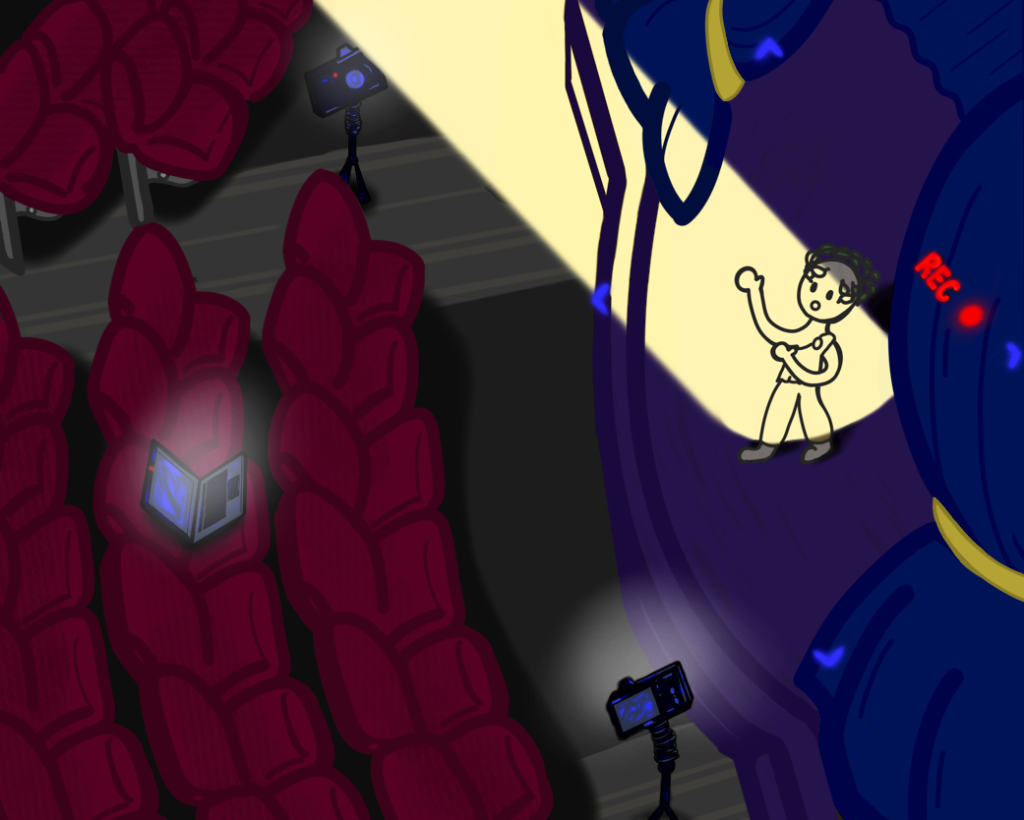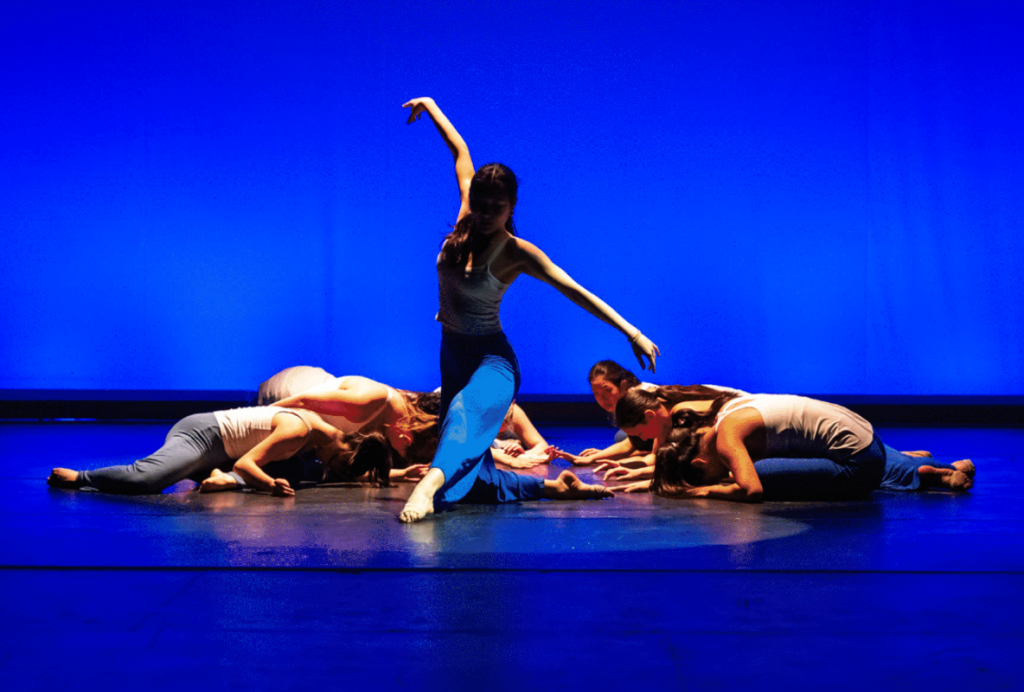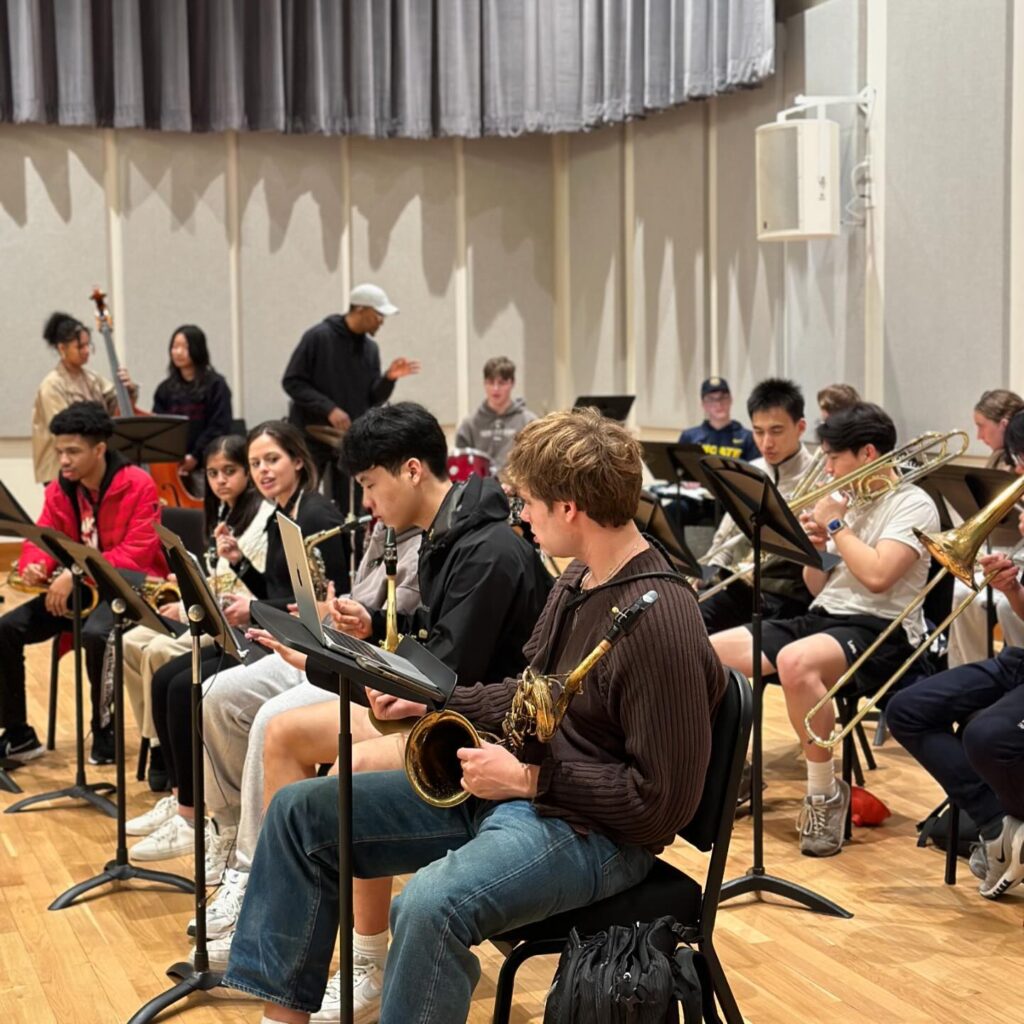Have you ever peered into the sky on a night out with friends or while stargazing solitarily during a stressful week, and suddenly thought you saw a bizarre moving silhouette? The fall play, Take-Away, invites its audience into a world of magical realism where unlucky high schoolers encounter an UFO in an eccentric adventure before their graduation.
The playwrights of Take-Away — English and acting teacher Mrs. Kate Doak, Ethan Bardoe ’21, Maxwell Brown ’21, Eliza Marovitz ’21, and Audrey Lim ’23 — began penning the script over the summer, envisioning a play in a less common genre of theater: science-fiction.
The ongoing Covid-19 pandemic forced the writers to make considerable changes to Take-Away which differentiate the play from productions shown outside of a pandemic. Ms. Doak and the group of students wrote the play in hopes that it would allow all interested students to participate, whether they were learning in-person or remotely. With this in mind, the writers formatted Take-Away as a performance specifically made to be recorded and shown asynchronously. To allow for more flexible casting, they also wrote gender neutral characters whose identities go beyond gender caricatures.

Graphic by Tony Lee/The Choate News
Over the summer, the writers frequently communicated with each other and shared their visions for each character. In combining differing ideas and perspectives, the writers hoped to breathe life into the characters they created. According to Marovitz, this process enriched the characters and made them more grounded and interesting. She also enjoyed the opportunity to incorporate her own personality and life experiences into the characters.
“Having actors read what we write — things that are actually about our lives, but they don’t know — has been really exciting and interesting,” said Marovitz.
When choosing the play’s setting, the writers contemplated whether to create a piece that reflects the current situation in modern-day America or present an escape from reality through a fantastical setting. The writers ultimately decided to set the events of the play several years before the present day, in a time when Zoom was first introduced.
“We decided not to take a stance on the current issues, because we tried to make something that people can just enjoy without thinking about the events happening around us,” said Bardoe. “What is great about theater is that it is a way to make the world around you not always be pushing down on you.”
The playwrights are not participating as actors, as they hope that the student-actors will interpret the script through their own eyes.
In virtual rehearsals during September remote learning as well as the mandatory quarantine period, students rehearsed their roles as usual within the safety of their individual rooms. Over the summer, the playwrights included scenes that were intended to be filmed outdoors and did not anticipate that masks would need to be worn outside. The cast subsequently had to quickly pivot from shooting outdoors to filming exclusively in green-screen rooms. After coming back to campus, every cast member was assigned to a specific room in the Paul Mellon Arts Center (PMAC) — each including a green screen, a microphone, and a complete video recording set-up — for filming. Since each PMAC room was only accessible to one actor, actors were allowed to remove their masks inside their assigned room.
With this new change, though, the actors had to learn how to perform not onstage, but rather in front of a green screen. This included familiarizing themselves with camera angles, learning the specific positions to stand in to appear like they are looking at each other in the gallery view on Zoom, and adjusting the equipment in their room.
“Theater is immediate; we are always bouncing off each other and trying something new. But with the current format, there are millions of new technical and organizational elements that we need to be attentive to,” said Marovitz.
It wasn’t easy for actors to present their characters without the theater’s physical sets and close proximity to other cast members. However, Marovitz noted that the virtual play allowed actors to explore a film-focused format of theater that they had never ventured into before.
Ms. Doak and the cast initially aimed for Take-Away to be a mix of pre-filmed video clips and a live performance on Zoom regulated by Zoom add-on tool ZoomOSC, which enables control over spotlighting, video, and gallery layouts.The cast also planned on utilizing OBS Studio, a streaming software that controls a virtual camera and the audio input and output for the video recording and live Zoom stream.
The live-broadcast premiere of Take-Away was originally scheduled for this weekend. However, technical setbacks led the group to delay the premier until winter term and to film every scene, removing the live component completely.
Featuring a quirky crew of personalities ranging from a firm believer in UFOs and extraterrestrial life to a cautious skeptic, Take-Away is set to premiere next term.



